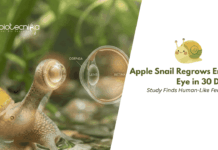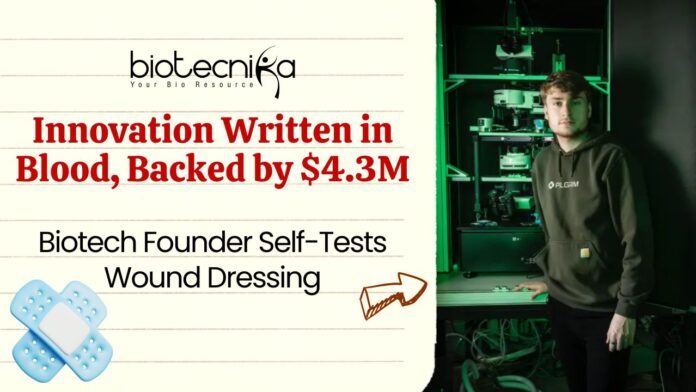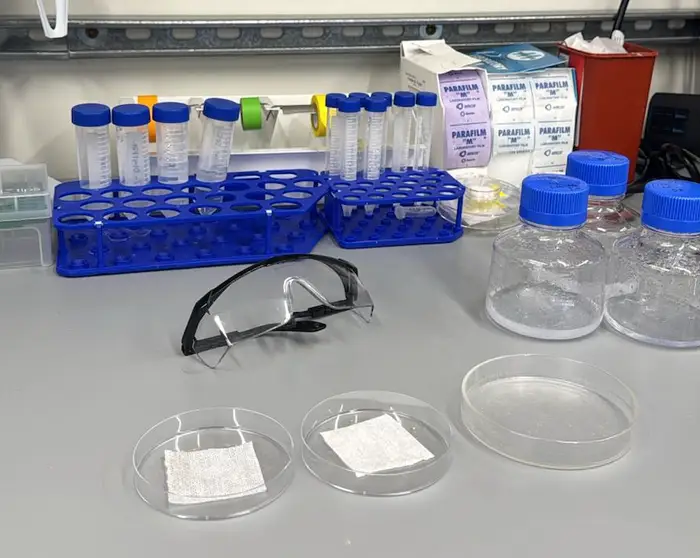Innovation Written in Blood, Backed by $4.3M – Biotech Founder Self-Tests Wound Dressing
While most startup founders rely on pitch decks and prototypes, Jake Adler made his point with a scalpel and his blood.
In a bold and medically calculated move, 21-year-old Jake Adler, founder of Pilgrim, a Biotech-defense startup based in Redwood, California, filmed himself cutting open both his thighs to demonstrate the effectiveness of his company’s flagship wound dressing, “Kingsfoil.”
Designed for battlefield trauma, Kingsfoil is a clay-based hemostatic gauze that transforms into a gel-like sealant upon contact with blood. This real-time transformation slows bleeding and promotes clotting, features critical for high-risk, time-sensitive trauma care.
Adler created two clean wounds using a punch Biopsy tool after numbing his legs with Lidocaine. One wound was treated with Kingsfoil, the other left untreated as a control. The result was a clear and visually compelling contrast.
“It is intended to undergo proper and rigorous clinical investigations,” Adler said of Kingsfoil before sterilizing his thigh in the video. “This is just a precursor to that.”
Despite the shock value of publicly self-testing the wound dressing, Adler emphasized the act was safe and legal. He studied the regulatory framework in advance and confirmed his right to self-experiment.
“When I looked through the laws, there was nothing that inherently said I couldn’t do a test on myself,” he added in an interview. “In the same way you can get a tattoo, I’m allowed to do anything to my own body.”
While he does not encourage others to replicate such extreme demonstrations, the video captured the attention of investors, which sparked a $4.3 million seed funding round.
A Daring Demo That Raised Millions
Shortly after Adler shared the footage of his self-tested wound dressing, Pilgrim closed a $4.3 million seed round, led by Cantos VC. Participants included Thiel Capital (Peter Thiel’s family office), Day One Ventures, Refactor Capital, and angel investors Joshua Browder, Cory Levy, and Adrian Fenty.
“We look for people who stand out and are a little weird,” Ian Rountree, general partner at Cantos, told Business Insider about Adler. “Jake is exceptional,” he added. “It’s one of those problems hiding in plain sight.”
That problem? Uncontrolled bleeding, a leading cause of preventable death in battlefield and emergency settings, is where reliable hemostatic solutions can mean the difference between life and death.
Kingsfoil: From Fiction to Medical Innovation
Adler named the dressing Kingsfoil after the healing herb from J.R.R. Tolkien’s The Lord of the Rings, continuing a trend among defense startups that embrace fantastical branding like Palantir, Anduril, and Erebor.
But Kingsfoil is far from fiction. It enters a competitive field of hemostatic products, such as:
- QuikClot, whose original zeolite-based formula caused heat reactions and burns before switching to a safer clay-based version.
- HemCon, which uses chitosan, a compound derived from shellfish.
Kingsfoil distinguishes itself through its instant gelling property, Biocompatibility, and ease of application, designed specifically for fast, efficient use in combat scenarios. Adler states that the dressing has shown no significant side effects, apart from mild skin irritation in some cases.
Img: Pilgrim’s Kingsfoil in both gauze and gel form. Credit: Business Insider
A Fast Track to FDA Approval
With Kingsfoil’s formulation based on existing materials, Adler believes the product may qualify for an expedited FDA (Food and Drug Administration) approval pathway, potentially shortening the approval timeline to just six months. If the FDA deems Kingsfoil as novel, the process could stretch to 12 to 18 months. “Pilgrim has already submitted multiple pre-submissions to the FDA,” Adler confirmed. The company remains focused on securing Regulatory clearance before bringing Kingsfoil to broader markets.
Defense Today, Civilians Tomorrow
Pilgrim’s initial focus is on the U.S. Department of Defense, where Medical needs are often more advanced than conventional Healthcare systems.
Adler sees the Defense Department as an “initial and first market” for his Tech because “their operational needs are roughly five to 10 years ahead of the general operating or emergency room,” he said.
However, the company is not limiting itself to military use. Adler has long-term plans to bring Kingsfoil into civilian hands, from ambulances to natural disaster response teams.
“My goal is to translate technologies to the everyday civilian,” Adler continued, adding that the company also hopes to one day sell the product commercially.
This dual-use model enables Pilgrim to serve both defense and healthcare markets, a strategy that is increasingly popular among startups navigating both public and private sectors.
A Biosecurity Arsenal in the Making
Kingsfoil is just the start. Pilgrim is also developing two additional innovations:
- Voyager – an inhalable mist designed to neutralize Chemical threats like nerve agents before they reach the bloodstream.
- ARGUS – a real-time surveillance platform for detecting Biological and Chemical hazards in ports, hospitals, farms, and other high-risk locations.
Both Technologies are in prototype and testing phases, developed by Pilgrim’s five-member team working out of a hybrid office-lab space in California.
From Sleep Science to Battlefield Solutions
Adler’s Biotech journey didn’t begin on the battlefield. In 2023, just a year out of high school, he became a Thiel Fellow, skipping college to work on a wearable device that aims to improve sleep by leveraging real-time Biometric Data.
“I was really compelled by this belief that we can move beyond that paradigm toward being able to leverage data in real time to augment the body,” Adler said.
This idea still underpins his work at Pilgrim, Adler added: “I’m interested in creating an enduring institution that can become a biotech prime and go beyond that and translate technologies back to the civilian.”
Conclusion: Innovation with Skin in the Game
Jake Adler didn’t just build a Biotech startup; he embodied it. By cutting through convention, quite literally, he proved that actual innovation demands not only vision but personal risk and relentless belief. His self-test wasn’t a stunt; it was a statement: that life-saving technologies deserve bold action and uncompromising urgency. His bold self-test of the wound dressing wasn’t a stunt, but a statement: innovation sometimes demands personal risk.
Pilgrim’s journey from a one-man demonstration to a multi-million-dollar defense Biotech venture signals more than a breakthrough in wound care. It marks the arrival of a new generation of founders unafraid to blur the line between conviction and proof. With Kingsfoil already turning heads in trauma innovation, and new tools like Voyager and ARGUS in development, Pilgrim isn’t just solving problems, it’s reshaping the frontlines of Medicine and security.
As the startup transitions from battlefield solutions to everyday civilian impact, one thing is clear: Biotech with skin in the game, and the future is already bleeding into the present.
























